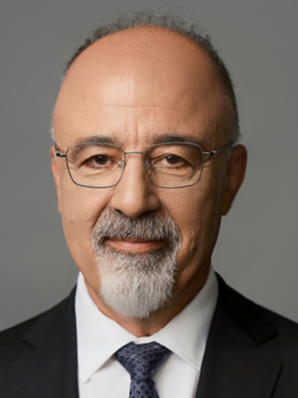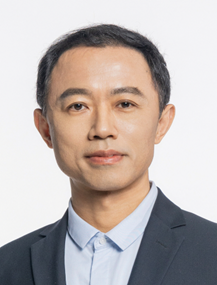Keynotes
April 12, 2024
May 12, 2024 (extended)
Special Session Proposal Deadline
May 17, 2024
3 June, 2024 (extended)
Regular Paper Submission Deadline
July 5, 2024
Live Demo Submission Deadline
August 9, 2024
Author Notification Date
August 23, 2024
BioCAS Student Travel Grants Application Deadline
September 6, 2024
Author Registration/Final Paper Submission Deadline
Wednesday, October 23, 2024
Onsite Registration Dates
Title: Chips over pills: the future of neurological intervention
Presenter: Prof. Timothy Constandinou
Affiliation: Department of Electrical and Electronic Engineering, Imperial College London
Abstract
Neurological conditions affect hundreds of millions of people worldwide, costing over $3 trillion per year, with half due to healthcare expenses. In Europe, these costs equal those of heart disease, cancer, and diabetes combined. Drug treatments are effective for only a few neurological conditions, due to the challenge of crossing the blood-brain barrier and the complexity of disease mechanisms. This leads to fewer successful drugs, rising costs, and declining investment by pharmaceutical companies. Existing medicines are often untargeted and cause undesirable side effects. Neurotechnology, enabled by advanced electronics, offers a promising alternative, with devices like cochlear implants and deep brain stimulators paving the way for new bioelectronic therapies. However, bringing these technologies to market is costly and complicated by regulatory and economic challenges. To succeed therefore, the neurotechnology ecosystem must consider economic, workflow and regulatory constraints in addition to the clinical need, scientific validity and technical. This keynote will explore how neurotechnology can leverage the semiconductor ecosystem to achieve scalability and bring benefit to more people. Integrated circuits improve power efficiency, performance, and capability, while microsystems technology enables further integration and miniaturization, streamlining clinical workflows toward minimally invasive surgery. By utilizing semiconductor manufacturing, supply chains, and design tools, the development of neural implants can become more economically viable. The talk will highlight recent advances, from our work and others, in the semiconductor neurotechnology stack including neural interface design re-use, chip-scale neural implants and implantable research platforms. With active human studies involving implantable devices for over 60 neurological conditions, the potential for innovation is greater than ever. Implantable neurotechnology is undoubtably on a trajectory to become mainstream, and we will soon see a shift from it being a last-resort option to an elective treatment at earlier stages of disease.

Biography
Timothy G. Constandinou received the B.Eng. and Ph.D. degrees in Electrical and Electronic Engineering from Imperial College London, UK, in 2001 and 2005, respectively. He is currently Professor of Bioelectronics at Imperial College London, where he is the Director of the Next Generation Neural Interfaces (NGNI) Lab and Head of the Circuits & Systems Research Group. He is also a Group Leader within the UK Dementia Research Institute, Care Research & Technology Centre. Dr. Constandinou’s research interests are in ultra-low power integrated circuit and microsystems technologies for resource-constrained applications, such as implantable neural interfaces. His lab focuses on creating innovative circuits, systems, and devices to support fundamental neuroscience and the translation of therapies for neurological health. He recently co-founded MintNeuro, an Imperial College spinout to translate his research in the field of implantable neurotechnology. Beyond his research, Dr Constandinou has made contributions to UK policy including leading the Royal Society iHuman perspective on Neural Interfaces, contributing to the KTP Neurotechnology UK roadmap, Regulatory Horizons Council recommendations on regulation for neurotechnology, and advising UK government (DSIT) on semiconductor capability. Within IEEE, he has served as Technical Program Co-Chair (BioCAS 2010-11, 2018, ISCAS 2024), General Chair (BrainCAS 2016, NeuroCAS 2018, Bioelectronic Medicines 2019, Royal Society Neural Interfaces Summit 2023), Plenary Co- Chair (ICECS 2020, 2022), Special Session Co-Chair (ISCAS 2017, BioCAS 2019), Tutorial Co-Chair (ISCAS 2021, BioCAS 2022, 2024), IEEE CAS Society Board of Governors (2017–19) and was Associate Editor-in-Chief of IEEE Transactions on Biomedical Circuits and Systems (2020–21).
Title: Closed-loop Neuromodulation to Manage Brain Disorders: Treatment and Prediction
Presenter: Mohamad Sawan, LFIEEE, FRSC, FCAE
Affiliation: School of Engineering, Westlake University
Abstract
Several of brain diseases remain unknown or ununderstood, some of these known diseases can’t be solved by regular clinical treatment. Consequently, wearable and implantable medical devices such as microsystems based closed-loop neuromodulators offer potential solutions. Built around neuromorphic brain-machine interfaces, these devices allow to diagnosis, treat, and predict some of these neurodegenerative diseases. This talk covers end-to-end brain-microsystem interfaces dealing with multidimensional design and implementation challenges such as massively parallel neurorecording sites, various biosensing methods, energy harvesting, power management, very low-power circuits, high-data rate transceivers, small silicon area, large memory room, artificial intelligence algorithms intended for various biomarkers detection, electrical/optical stimulations, etc. Case studies include neurotransmitters detection, neural cells and organoids culture and manipulation, On set detection/prediction of epileptic seizures and Alzheimer, addictions suppression, and vision enhancement.

Biography
Mohamad Sawan is Chair Professor in Westlake University, Hangzhou, China, and Emeritus Professor in Polytechnique Montreal, Canada. He is the founder and director of the Center of Excellence in Biomedical Research on Advances-on-Chips Neurotechnologies (CenBRAIN Neurotech) in Westlake University, and of the Polystim Neurotech Lab in Polytechnique Montreal. He received his Ph.D. degree from the University of Sherbrooke, Canada. He served as a Distinguished Lecturer of both IEEE CASS and IEEE SSCS for three consecutive years each. Co-Founder, Associate Editor and was Editor-in-Chief of the IEEE Transactions on Biomedical Circuits and Systems (2016-2019). He was awarded the Canada Research Chair in Smart Medical Devices (2001-2015) and was leading the Microsystems Strategic Alliance of Quebec (ReSMiQ), Canada (1999-2018). Dr. Sawan received several awards, among them the Barbara Turnbull Award from the Canadian Institutes of Health Research (CIHR), the J.A. Bombardier and Jacques-Rousseau Awards from the Canadian ACFAS, the Queen Elizabeth II Golden Jubilee Medal, the Medal of Merit from the President of Lebanon, the Chinese National Friendship Award, and the Shanghai International Collaboration Award. Dr. Sawan is a Fellow of the Royal Society of Sciences of Canada (FRSC), a Fellow of the Canadian Academy of Engineering (FCAE), a Fellow of the Engineering Institutes of Canada (FEIC), a Life Fellow of the IEEE (LFIEEE), and an “Officer” of the National Order of Quebec.
Title: Minimally Invasive Brain Computer Interface: From Bench to Bed
Presenter: Prof. Bo Hong
Affiliation: School of Biomedical Engineering, Tsinghua University
Abstract
Intracranial BCI can assist severely disabled persons in assistive communication and active rehabilitation. Nevertheless, sustainable BCI implants require minimal invasiveness. We developed a miniaturized epidual BCI implant with only 8 electrodes (NEO system). The 25mm-diameter device can be fitted in the skull, with no battery included. Power was supplied remotely through inductive antenna, and the epidual ECoG were transmitted wirelessly to the receiver attached outside the scalp. The NEO system was tested on white pigs, showing its capacity of stable long-term recording of epidual ECoG, while keeping cortical cells intact. With ensured minimal invasiveness and long-term safety, the first-in-human trial of clinical implantation was made on October 24th, 2023, and the second on December 19th, 2023 respectively. The first tetraplegia patient with spinal cord injury regained the ability of grasping objects, and even drinking water with help of the BCI. Additionally, the patient showed substantial neurological recovery through consecutive BCI upper limb training, regaining the ability to hold objects without BCI assistance. The patient demonstrated a 5-point improvement in ISNCSCI upper limb motor scores and a 27-point increase in the Action Research Arm Test (ARAT). Improvements in electrophysiological assessments point to a considerable recovery in impaired neural circuits. The second BCI-implant patient can control a computer cursor to play games and maneuver a wheelchair just by motor imagery. Both patients have been using the NEO BCI at their home for over 8 months.

Biography
Dr. Bo Hong received his Ph.D. degree of Biomedical Engineering from Tsinghua University in 2001. From 2004 to 2005, he was a visiting scientist in the Department of Biomedical Engineering and the Center for Neural Engineering at Johns Hopkins University, USA. He is now full professor with School of Biomedical Engineering, Tsinghua University, and an investigator of McGovern Institute for Brain Research at Tsinghua. His main research interests are brain computer interface and language network in human brain. His team designed and developed minimally invasive BCI - NEO system and conducted the first-in-human clinical trial successfully in 2023. He has co-authored more than 80 papers on Nature Neuroscience, PNAS, Nature Communications, NeuroImage, Journal of Neuroscience etc. He has served as the Associate Editor of IEEE Transactions on Biomedical Engineering and IEEE Transactions on Neural Systems and Rehabilitation Engineering.